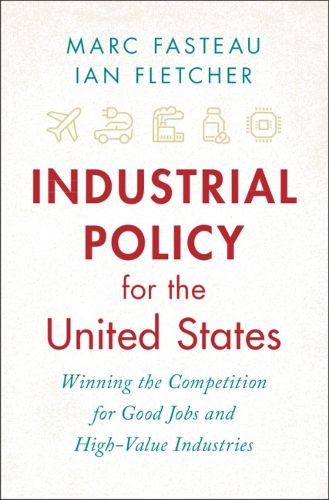Readings Newsletter
Become a Readings Member to make your shopping experience even easier.
Sign in or sign up for free!
You’re not far away from qualifying for FREE standard shipping within Australia
You’ve qualified for FREE standard shipping within Australia
The cart is loading…






The U.S. is losing the competition for good jobs and high-value industries because most of Washington believes trade should be free, the dollar should float, and that innovation comes exclusively from the private sector. In this book, the authors make the bold case that these laissez-faire ideas have failed and that a robust industrial policy is the only way for America to remain prosperous and secure. Trump and Biden have enacted some of its elements, but it needs to be made systematic and comprehensive, including tariffs to protect key industries, a competitive exchange rate, and federal support for commercialization-not just invention-of new technologies. Timely, meticulously researched, and bipartisan, this impressive analysis replaces misunderstandings about industrial policy with lucid explanations of its underlying economic theory, the tools that implement it, and its successes (and failures) in America and abroad. It examines key industries of the past and future - steel, automobiles, television, semiconductors, space, aviation, robotics, and nanotechnology. It concludes with a realistic, actionable policy roadmap. A work of rigor and ambition, Industrial Policy for the United States is essential reading.
$9.00 standard shipping within Australia
FREE standard shipping within Australia for orders over $100.00
Express & International shipping calculated at checkout
The U.S. is losing the competition for good jobs and high-value industries because most of Washington believes trade should be free, the dollar should float, and that innovation comes exclusively from the private sector. In this book, the authors make the bold case that these laissez-faire ideas have failed and that a robust industrial policy is the only way for America to remain prosperous and secure. Trump and Biden have enacted some of its elements, but it needs to be made systematic and comprehensive, including tariffs to protect key industries, a competitive exchange rate, and federal support for commercialization-not just invention-of new technologies. Timely, meticulously researched, and bipartisan, this impressive analysis replaces misunderstandings about industrial policy with lucid explanations of its underlying economic theory, the tools that implement it, and its successes (and failures) in America and abroad. It examines key industries of the past and future - steel, automobiles, television, semiconductors, space, aviation, robotics, and nanotechnology. It concludes with a realistic, actionable policy roadmap. A work of rigor and ambition, Industrial Policy for the United States is essential reading.